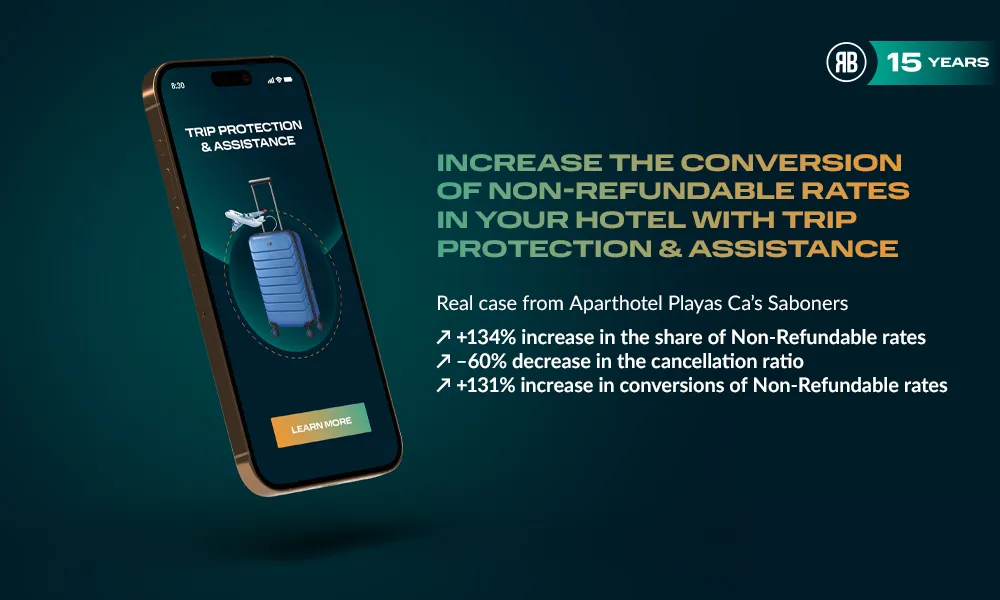Sustainable sourcing: an important pillar of the hotel industry
News
May 16, 2025

Content in collaboration with our partner Bioscore Sustainability, a sustainability consultancy for tourism companies.
Redesigning the supply chain for a responsible future: Sustainable suppliers
In a sector as dynamic as the hotel industry, sustainability is no longer an added value: it is a basic expectation of travelers and a strategic necessity for companies. Although traditionally efforts have focused on energy efficiency, water management, or the elimination of plastics, there is a key pillar that is still underexploited: building a solid network of sustainable suppliers.
From Bioscore and Roiback, we want to highlight the importance of including responsible suppliers whenever possible in the operational areas as a strong contributor to help transform the future of tourism.
The strategic role of sustainable suppliers
Adopting sustainable suppliers involves working with companies committed to responsible practices, from the ethical origin of their products or services to their energy efficiency and positive social impact. This network can include everything from agroecological producers and manufacturers of biodegradable amenities to efficient software developers like Roiback (a carbon-neutral organization) or maintenance companies that apply circular economy principles.
Working with sustainable suppliers not only improves a lodging's ESG (Environmental, Social, and Governance) performance, but also strengthens its differentiation in the market, attracts the attention of new profiles of conscious travelers, and can facilitate access to green financing sources.
Direct impact on the guest experience and the internal processes of the accommodations
The incorporation of sustainable suppliers tangibly transforms the guest experience.
From plastic-free amenities, made with certified natural ingredients, to gastronomic menus made with products of Km 0 origin, every detail reinforces the ethical and sustainable positioning of the establishment.
Even in areas such as interior design, the use of recycled materials, textiles with low environmental impact or furniture manufactured under circular criteria, or collaborating with local artists in the creation of traditional pieces in the decoration of the accommodation, reinforces the sustainable positioning of the establishment.
Sustainability is not only perceived, it is lived in every experience: in the soap in the bathroom, in the breakfast with locally sourced ingredients, or in the energy efficiency of the air conditioning system.
Some key benefits of working with sustainable suppliers also imply an important transformation in internal processes:
· Use of biodegradable cleaning products.
· Choice of laundries with water saving and chemical reduction policies.
· Implementation of efficient management software.
· Installation of systems and equipment that operate with renewable energies.
· Regulatory compliance and alignment with ESG regulations and environmental certifications.
· Support for business models that promote value chains with social responsibility policies.
Consolidating a network of sustainable suppliers
The road to a network of sustainable suppliers is not without challenges. The limited availability of certain products or services, especially in some regions, can complicate the process. However, far from being an obstacle, this encourages hotel companies to adopt a progressive strategy of continuous improvement.
Recommended good practices:
· Define clear criteria for the approval and evaluation of suppliers, taking into account their sustainable management.
· Create internal responsible purchasing policies that involve all areas and train teams accordingly.
· Inform suppliers about your company's sustainable management principles and ask them to commit to them.
· Foster long-term relationships with committed suppliers.
· Include information on the principles and results of the sustainable management of your suppliers in your sustainability reports, such as NFIS's or Annual Reports.
Regarding NFIS's (Non-Financial Information Statement) and sustainability reports, the consulting area of Bioscore can assist you in developing these products, preparing your reports in accordance with the requirements established by Directive 2014/95/EU, also known as the Non-Financial Information Directive, transposed into Spanish legislation as Law 11/2018, of December 28, in the first case; or following the GRI (Global Reporting Initiative) standards, in the case of sustainability reports.
The goal is not immediate perfection, but constant progress towards a more ethical, traceable, and resilient supply chain.
A strategic opportunity to lead the change
Incorporating sustainable suppliers in the areas of accommodation can be a strategic decision that brings coherence to the brand, reinforces customer trust, and prepares the company for a future in which sustainability will be increasingly valued and demanded.
The future of tourism is in the hands of those who know how to integrate responsibility throughout their value chain. The choice of suppliers is one of the decisive steps to lead that change.
Read more







